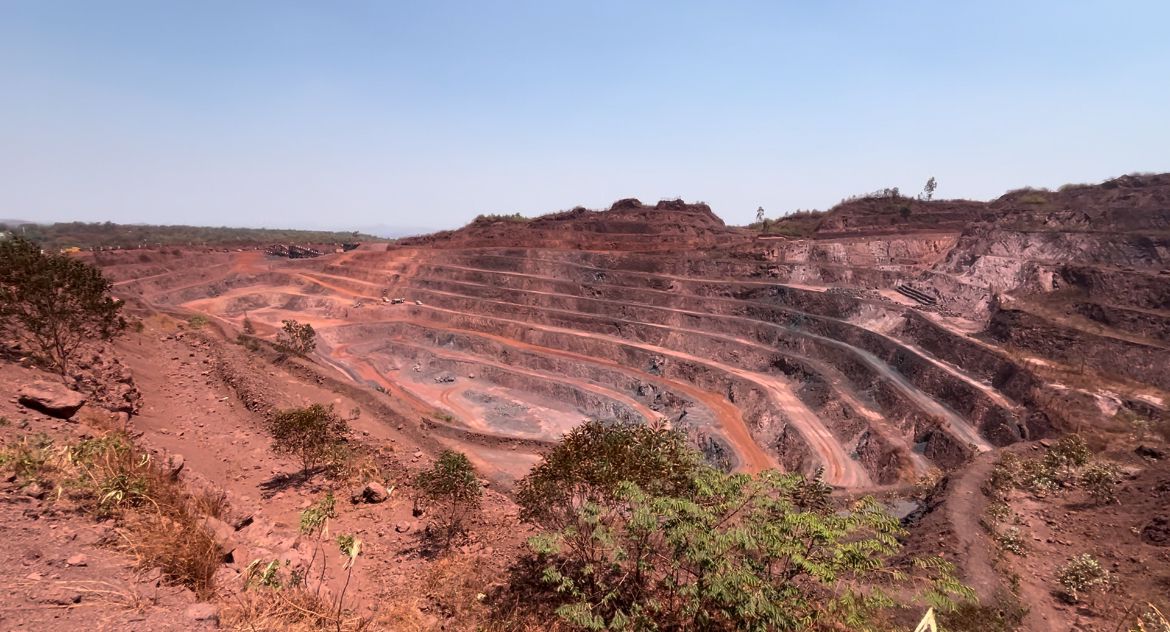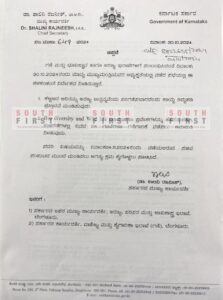Published Nov 13, 2024 | 12:55 PM ⚊ Updated Nov 18, 2024 | 8:25 AM

One of the mining blocks on Kumaraswamy Hills. (South First)
In a surprising contrast to recent actions, where Karnataka’s Minister for Forest, Ecology, and Environment, Eshwar Khandre, took a strong stand against the alleged felling of hundreds of trees for a movie shoot in Bengaluru, the Siddaramaiah-led government seems poised to prioritise economic interests over environmental concerns.
While Khandre filed a case against the production house for its disregard of nature, the state’s broader agenda now appears to undermine environmental protection.
The government is reportedly planning to lift the night ban on mining activities and reclassify iron ore as a non-forest product, decisions that risk disregarding the delicate balance between economic growth and the preservation of both forests and the lives of people dwelling surrounding to the mining areas.
South First has accessed documents that show Chief Secretary Shalini Rajneesh proposing two subjects connected to the mining and forest departments are being listed before the upcoming cabinet meeting on 14 November.

Karnataka Chief Secretary’s letter pointing out two directives following a meeting on 30 October 2024.
The government’s plan to lift the night ban on mining activities and to remove iron ore from the list of forest products has caused concern among environmentalists and former mining industry professionals.
In what could be the catastrophic move, the Siddaramaiah-led Congress government is set to make significant decisions that benefits the mining industry while potentially causing severe harm to the forest and livelihood.
In the upcoming cabinet meeting, the Congress government is all likely to deliberate and take decision on lifting night ban on mining activities and exclude iron as the product of forest. The cabinet meeting is scheduled on 14 November.
In a government document, accessed by South First, it is evident that there are proposals on allowing mining activities for all the 24 hours in a day and reclassifying iron ore as the non-product of forest.
It is important to note that these two subjects are being brought before the cabinet on the directions of Chief Minister Siddaramaiah, according to the document.
As per the document: “Proposing amendment to the act so that iron ore should not be considered as a forest product. Excluding bio diversity and wildlife sanctuaries, permitting mining 24 hours a day.”
Iron ore is said to be available in huge quantities in the Ballari, Vijayangara, Chitradurga, Tumakuru, Bagalkot and Chikkamagaluru. Currently, it is reported that iron ore is being mined only in Ballari and Vijayanagara districts.
Minister for Forest, Ecology and Environment Eshwar Khandre told South First: “There is no such proposal about lifting night ban on mining activities before the government. I think someone gave a representation on reclassifying iron ore as non-product of forest. There are no such proposals before the government.”
While the state government is considering to permit 24 hours mining and reclassify iron ore as the non-product of forest, the wildlife experts and environmentalists, have lashed out at the government and termed it a “disastrous” move.
The wildlife experts claim that lifting night ban on mining activities would turn hazardous to wildlife and people as well. It might contribute to further rise in mercury levels, affecting hundreds of thousands of people.
Wildlife Expert Krupakar told South First: “In any habitat, whether protected or non-protected, wildlife of that particular place have their own circadian rhythm, which directs their activity pattern and behaviour.”
“Animals which are nocturnal are especially shy and sensitive to disturbance like, light, sound and physical movement. Hence, they tend to avoid/alter their movement pattern. This can directly affect their overall survival and reproductive behaviour. They need a lean time of at least a few hours when dust and sound settles,” the wildlife expert claimed that it would impact the wildlife.
He further noted: “Mined Forest areas in North Karnataka are already highly disturbed ecology. But you will be surprised to see the wildlife coming alive after dark.”
“The least we could do is to give them some respite during the night. Slowly the rules and regulations protecting our last remaining wilderness are being diluted, one step at a time, to favour the unknown hands. We change governments hoping for better. But it is unfortunate that it is only getting worse,” Krupakar said.
Environmentalist Samad Kottur told South First: “Sandur has rich biodiversity, with housing thousands of wildlife including leopard and sloth bear. They (government) claim that similar decisions have been taken in Jharkhand and Chhattisgarh but there it has different issues because these two states have rich forest cover, which ensures ample space for wildlife.”
“But, here, the forest cover is very minimal. The wildlife is confined to limited forest area. As the mining is banned at night, the wildlife is breathing easily with roaming around. If the mining is permitted 24 hours, then there are high chances that wild animals entering into the nearby residential localities, leading to increase in wild-human conflict,” Kottur appealed to the government not to take such decisions.
Condemning the government decision, former miners have vehemently opposed the state government’s move on lifting night ban on mining activities and excluding iron ore as the non-product of forest.
Former Miner Tapal Ekambaram told South First: “The state government cannot reclassify the iron ore as non-product of the forest because it comes under the purview of the union government. There has to be a peaceful life for not just human beings but also wildlife as well.”
“If the flora and fauna in and around Ballari is being maintained, it is because of the illegal mining is being curbed since a decade. If they are planning to lift night ban, there should be a proper system in place, which appears to be not in place. There won’t be controlled or monitored mining at night,” Ekambaram added that there are no sincere officials or leaders left to save our forest.
He added that this move from the government clearly shows that it is planning to increase its revenue resources, with exploiting the ecosystem.
Samaja Parivarthana Sumudaya’s member Shreeshail A told South First: “The government is gearing up to take one of the most hazardous decisions in connection to the mining activity and forest. This move will pave the way for the illegal mining activities that took place between 2004 and 2011.”
“This will not just affect the wildlife but also the entire ecosystem including lives of the people dwelling surrounding to mining areas. Even in lokayukta report it was highlighted in detail about the illegal mining activities. These decisions are unscientific and shows the height of foolishness from the government,” Shreeshail opposed this vehemently.
He further noted: “The government is currently spending crores of rupees for the reclamation and rehabilitation of mining affected areas. On the other hand, it is making efforts to damage the ecosystem completely. In Sandur taluka alone, at least 500 accidents are reporting every month because of mining.”
“This emphasises that rampant mining is threat to the lives of people. Currently, at least 8,000 to 9,000 lorries are operating for mining in Sandur alone. This itself has taken away the people of thousands of families. With government planning to permit mining activities throughout the day, it will further increase the accidents,” Shreeshail highlighted that Geological Survey of India restricts mining at night.
He also claimed that opposing the government’s move, Samaja Parivarthana Sumudaya has written to the Chief Minister not to take hazardous decision.
(Edited by Ananya Rao)

